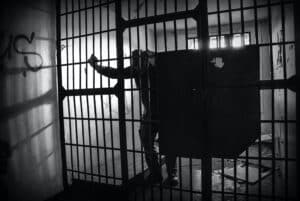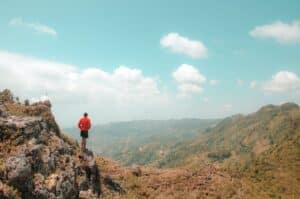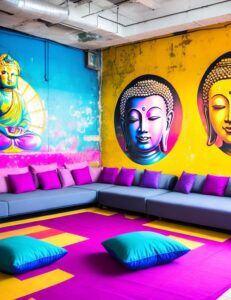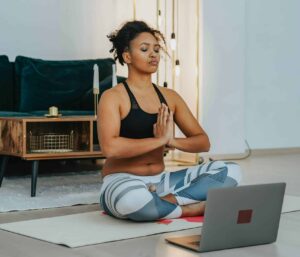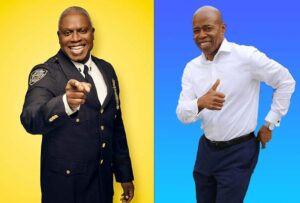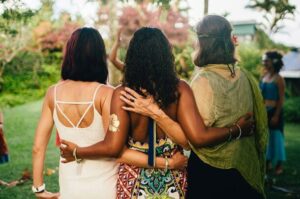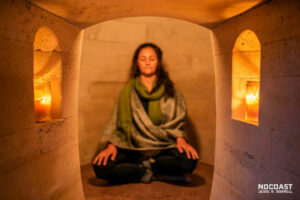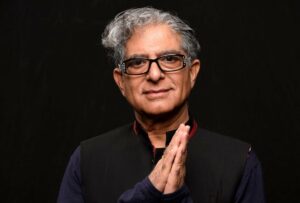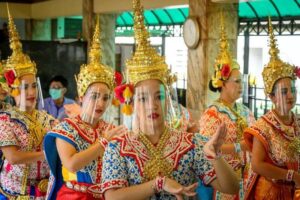Are you feeling it in your body? The uncertainty and anxiety? If so, you’re not alone.
Can you feel the tectonic plates shifting? We are in no ordinary time. The shifts we see and feel today as we collectively experience election anxiety are shaking us to our core. Hopefully, it is helping us to wake up. To what are we awakening? Broken governance? Racial injustice? The power of a pandemic? Global interconnection? Climate change?
Are you feeling it in your body? The uncertainty and anxiety? If so, you’re not alone. The results of the 2020 Survey from the American Psychological Association are in and it is sobering. According the to the survey, the US is “facing a national mental health crisis that could yield serious health and social consequences for years to come.” Election anxiety is at an all time high.
How do we metabolize and transform the stress that is arising so that it doesn’t lead to more stress, creating an untenable feedback loop. After all, stress, difficulty, and trauma are not solely cognitive, they are written into the body. Further, what to do if the source of the stress isn’t easily avoidable? As Bessel van der Kolk, a leader in the field of trauma, points out, “unlike other forms of psychological disorders, the core issue in trauma is reality.”

These days I believe most of us knows what van der Kolk means. By merely showing up to life and paying attention we are being depleted. Each day we witness an unfolding and intensifying global pandemic, the dysfunction of our government, extreme election anxiety, the breakdown of civil discourse, systemic racism, and climate change.
Could it be that mindfulness, an ancient practice, underpinned by current neuroscience, offers something meaningful in this time of great challenge? I believe so.
What is mindfulness? There are pat answers, but I find it tricky to neatly sum up what mindfulness is, as it encompasses different skills and insights. Let me say that mindfulness is a multi-faceted practice of contemplation, body-focused awareness, thought-watching, and present moment attention, as well as the cultivation of equanimity, kindness, compassion, and joy. More to the point, daily mindfulness practice is designed to engage deeply and authentically with the lived experience of being human. Here are some ways to engage mindfully with all that is unfolding.
Get curious – what do I control
At moments like these it is good to consider what is in your control. I’d like to suggest that, paradoxically, we control both more and less than we think, in any given moment. Getting clear about what we do and don’t control helps to clarify what we are doing and why. We do control our actions. Please vote! Talk to friends and loved ones who are supportive. Seek out input that makes you laugh, that buoys your spirit.
We influence our own mind states greatly by the kinds of activities we engage in and by the lens through which we choose to view life. With this in mind, don’t spend too much time complaining or steeping in election anxiety. Don’t feed your fears and the fears of others. Go for a long walk. Hold firmly to gratitude, neuroscience shows gratitude has many measurable benefits.
Another thing in your control is where you place your attention. Skillfully deploying attentional resource is a foundation of mindfulness. May I kindly take this moment to recommend stepping out of the 24 hour news cycle. Be vigilant about what kind of media you consume and engage in. Take time away from the noise and turn toward beauty, love, kinship, and kindness.
It is also helpful to consider the roles you play at this time. Are you someone’s parent, partner, postman, teacher, or caretaker? Every role is essential to someone. Feeding your own resilience and stamina, in order to show up more fully in your own life, is time well-spent. Turn toward self-care, if at all possible. We can’t “pour from an empty cup” as the adage goes. Take time to fill yourself back up. The messiness and brokenness of the world will be here tomorrow and you’ll probably be more ready to face it if you’ve had a good night’s sleep.
Perhaps even more important than reflecting on what you do control is reflecting on, and making peace with, what you don’t. Letting go of what isn’t in your control can be liberating. Stay in your lane. Find what is authentic and enlivening to you. March in the streets if that’s your thing. Write letters, send emails. Study the complexity of what is happening. Get smarter. Run for office? But don’t wallow in your election anxiety, don’t feel like you have to solve every problem, that isn’t possible, and it robs you of clarity and energy.

Look deeply – shared humanity
We can look at this time of overwhelming election anxiety as an anomaly, as an affront, as something that shouldn’t be happening. In fact it is more true to say that this has always been happening, from the very beginning. Winston Churchill is sometimes quoted as having said, “history is simply one damn thing after another” (the quote is sometimes attributed to others). It is a rather bleak view of the trajectory of history, however it isn’t untrue. One part of the overarching story of mankind has always been a story of suffering and destruction, of hatred and greed, of the powerful lording over the powerless.
With this in mind we can open our heart toward, and feel a kinship with, all of the others peoples who have suffered injustice and challenge throughout history? We’re not so special and it’s not personal. It’s been going on for a very long time. Instead of letting that thought defeat you, let it build grit and resilience. Other peoples have faced much worse and they rose to the occasion. Let that be us.
Further, difficulty and challenge isn’t the full story! There is so much goodness everywhere, all the time. It is important to celebrate the bravery, the vision, the extraordinary accomplishments that have taken place throughout history, up to and including this very moment. The human story is full of magnificence, courage, love, and compassion. Take a moment to bring to mind those people, those movements, and those chapters that inspire you. Look at your own life and ask, “what is going right?” Ours is also a history of surviving, thriving, and grace. Don’t lose sight of that in these next days and months.
Cultivate strength – the warrior side of mindfulness
To look directly and deeply into what the Buddha called “the 10,000 joys and 10,000 sorrows” of life is not for the faint of heart. The practice of mindfulness, attending to what is happening, to all that is unfolding, calls for a fierce commitment to truth-telling, curiosity, and going where the evidence leads. Mindfulness is not making nice, it is not pretending. Mindfulness is walking the razor’s edge of truth and being willing to bear witness to all that is seen. Contact your inner warrior. Study ancient or modern wisdom that inspires you. Fine-tune your moral compass. Double down on focus and determination. Don’t lose this opportunity to be your best self, in service of what is good and true. The world needs you. Show up and don’t expect it to be easy.
Transform the world, transform yourself
A key part of mindfulness practice is not letting one’s self off the hook. It might appear that all the disarray, inequity, and problems are out there. If only other people could change then everything would be just fine. But the problems facing us are not created only by external forces. We must look at ourselves honestly.
While looking at what is “wrong” with the world, I often turn the lens back on myself. When I notice that others are intolerant, I ask, “where am I intolerant? How does that live in me?” When I see inflexibility, judgment, and unkindness in others, I wonder, “how am I unkind, inflexible, and judgmental?” We all have blindspots, we have emotions that get the best of us, we fail and we fail often. Creating space to look deeply at our own confusion can soften our hearts towards others.
Do a practice – lovingkindness
I’d like to close by offering lovingkindness practice. Lovingkindness is the practice of wishing yourself and others well. It seeds goodness and creates kinship with everyone else on the planet. When practicing lovingkindness we intentionally think kind thoughts and embody the compassion that the world so desperately needs.
To do this practice, sit quietly for a few moments, settle yourself. Once you are settled, offer the following phrases, either out loud or think them silently, perhaps placing a hand on your heart. Send the following thoughts to yourself, to loved ones, to a neutral person that you might not normally notice, and even to your so-called enemy. I believe part of the thinking is that if your enemy was truly free, happy, safe, and well, would they be your enemy at all? Would we need the word enemy in a world filled with peace and goodwill?
The phrases I am offering are partially tradition and partially ones I have been working with purposely during this challenging time. Feel empowered to create different phrases that are meaningful to you.
May all beings everywhere, without exception, live with peace, ease, and well-being ? May all beings everywhere, without exception, be healthy, happy, and free ? May all beings everywhere, without exception, be safe, valued, and protected ? May all beings everywhere, without exception, be free from confusion and delusion ?

Wishing you ease and well-being in these next days and weeks. May we live into and increase what is best in us as individuals, as a nation, and as a world. May we root out and decrease all harm that we cause ourselves, others, and the planet.



